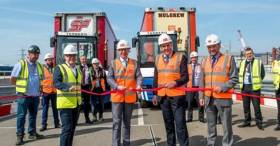Displaying items by tag: £10m Linkspan Unveiled
#FerryNews- Heysham Port on the Irish Sea, is where a new link-span bridge was officially unveiled, as part of £10m investment by the port owner-operator Peel Ports to increase throughput at the Lancashire port in north-west England.
The investment according to Peel Ports is a direct response to the economic potential facilitated by the Bay Gateway link road that connects Heysham directly with the M6.
The port is already a key gateway for Irish Sea trade with numerous daily sailings operated by Seatruck, Stena Line and the Isle of Man Steam Packet Company.
As well as the new link-span, which provides a third berth for freight and passenger traffic, the investment also includes a new port entrance and a pontoon for offshore crew transfer vessels, which is currently under construction and is set to open later this year.
A new terminal operating system supplied by Hogia has also been introduced to digitise the management of freight transport through the terminal, helping to improve operational efficiency.
The investments by Peel Ports have been made within 18 months of the opening of the new £140m link road which bypasses congestion in Lancaster. The 4.8km route cuts the journey time for goods traded between the UK and Ireland by 30 minutes, offering a significant cost saving to cargo owners and hauliers.
According to some studies before the road opened, the economic growth forecast could potentially support 250 new jobs in port-related activity and hundreds more in haulage, logistics and distribution. It is estimated that for £1 invested, the link road will earn £4.40 for the local economy.






























































